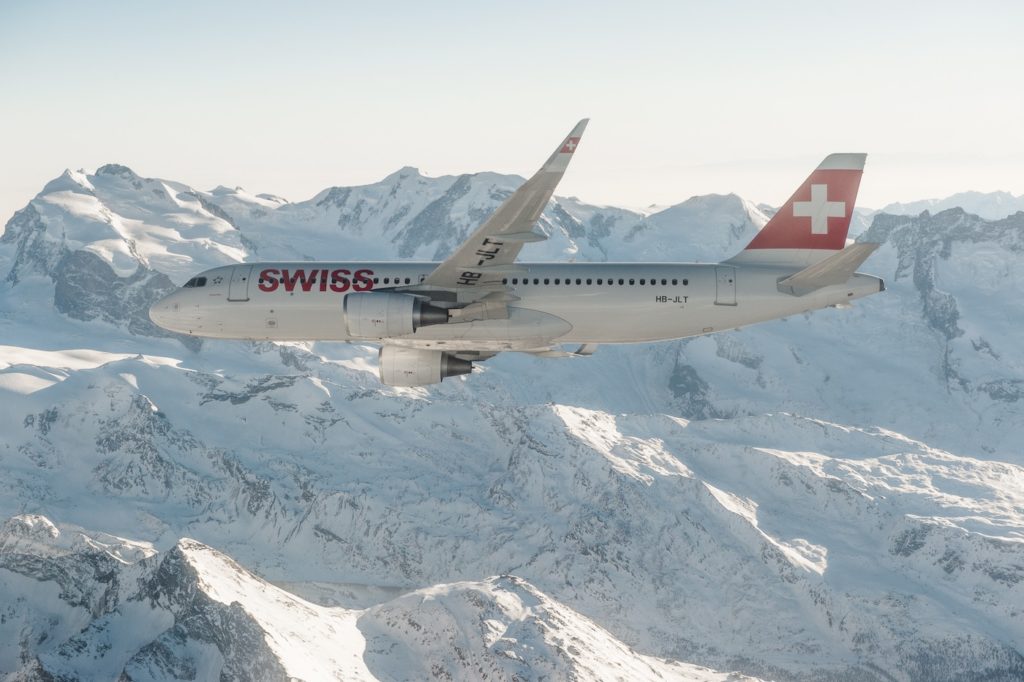
Swiss International Airlines, says its fleet, such as the A320 pictured here, will be 100 percent ADS-B Out equipped by the June 7, 2020 mandate. Photo: Swiss International Airlines
The number of aircraft operated by European airlines in compliance with EASA’s June 7, 2020 ADS-B Out mandate has doubled to more than 40 percent since October 2018, according to a report on the flight information region’s fleet equipage status published by the Single European ATM Research Agency Deployment Manager (SESAR DM).
According to the report, regulators are developing a new exemption policy that will allow operators to continue to fly some aircraft that are not ADS-B equipped by the deadline due to financial or technological configuration barriers. SESAR DM’s report comes a year after stakeholders affected by the mandate from across the European aviation community participated in a workshop to establish a plan to produce the necessary policy framework needed to get aircraft equipped and provide exemptions for others.
A survey of 70 of Europe’s largest cargo and passenger airlines performed by SESAR DM in April found that there are three different groups of commercial air transport aircraft currently flying in Europe that will not be able to meet the June 7, 2020 deadline, but could either be equipped several years after or be phased out of commercial service altogether.
According to SESAR DM, these segments include aircraft that have limited ADS-B Out equipment options available based on service bulletins, STC or parts availability and installation shop capacity. The agency pegs this group at about 17 percent of the 7,500 registered aircraft that were accounted for in their survey.
Another 10 percent of aircraft will be phased out of service before getting any real in-service use of ADS-B Out surveillance, than 3 percent of aircraft have onboard avionics configurations which make it financially prohibitive for airlines to upgrade them.
A major takeaway from the latest reported fleet data and the development of an exemption policy in the works by EASA, shows that the aircraft that need upgrades are getting them, slowly but surely.
Croatia Airlines for example, operates a fleet of 12 aircraft split into Airbus A320s and Bombardier Dash-8s has been undergoing transponder upgrades throughout the earlier portion of 2019, according to Eleonora Jurela, the Croatian carrier’s engineering department manager.
Jurela said the airline’s A319s will undergo transponder modifications that are scheduled for completion by May 2020.
“The biggest issues we’ve encountered were related to some really long lead times for mod kits and equipment needed both for prerequisite as well as for ADS-B Out units installation. This forced us to reschedule some activities,” Jurela said. “We’ve been unpleasantly surprised that most of our existing ATC transponders were not eligible for the upgrade. Due to the lack of certain vendor modifications, the upgrade on those aircraft was considered to be ‘beyond economical repair.’ This issue has been solved eventually with help of Airbus and the vendor but followed with significant adjustment in our ADS-B Out implementation schedule.”

The pre and post-ADS-B ATM structure in Europe. Photo: SESAR DM
On the Airbus fleet, Croatia is upgrading to a new Collins Aerospace ADS-B Out transponder, and the Dash-8s will also gain an ADS-B Out compliant transponder upgrade, she said. The installation work was co-financed by the European Commission under the Connecting Europe Facility (CEF) program’s cohesion policy.
Swiss International Airlines is in a similar situation to Croatia. The Lufthansa Group subsidiary operates a fleet of 89 total aircraft, including Airbus A220s, A320s and A330s, along with Boeing 777s and Bombardier Dash-8s.
A representative for Swiss International told Avionics that their 777s and A220s are already compliant, while modifications are under way for the remainder of the fleet. Their entire long-haul fleet will be compliant by January 2020, as a portion of those fly to the U.S., where the FAA is mandating ADS-B Out equipage by Jan. 1, 2020.
“The challenge initially was the delay of the certification of the transponder by manufacturers. Our purchase orders have been placed and confirmed. We are confident to be able to receive all necessary parts in due time in order to be compliant at the respective due dates,” the representative said.
The agency’s report indicates the full in-service fleet of European airliners will not reach 100 percent compliance until 2025.